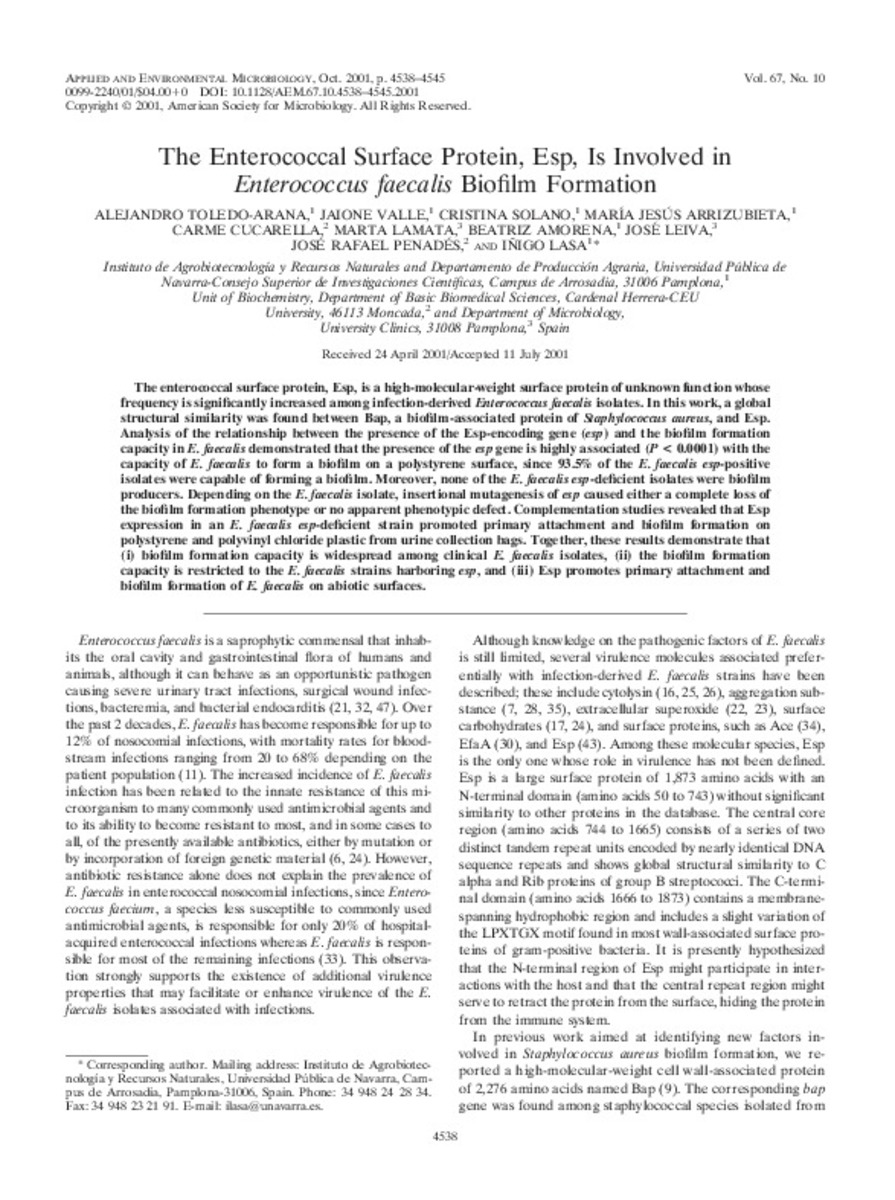Full metadata record
| DC Field | Value | Language |
|---|---|---|
| dc.creator | Toledo-Arana, A. (Alejandro) | - |
| dc.creator | Valle, J. (Jaione) | - |
| dc.creator | Solano, C. (Cristina) | - |
| dc.creator | Arrizubieta, M.J. (María Jesús) | - |
| dc.creator | Cucarella, C. (Carme) | - |
| dc.creator | Lamata, M. (M.) | - |
| dc.creator | Amorena, B. (Beatriz) | - |
| dc.creator | Leiva, J. (José) | - |
| dc.creator | Penades, J.R. (José R.) | - |
| dc.creator | Lasa, I. (Íñigo) | - |
| dc.date.accessioned | 2013-09-02T10:48:53Z | - |
| dc.date.available | 2013-09-02T10:48:53Z | - |
| dc.date.issued | 2001 | - |
| dc.identifier.citation | Toledo-Arana A, Valle J, Solano C, Arrizubieta MJ, Cucarella C, Lamata M, et al. The enterococcal surface protein, Esp, is involved in Enterococcus faecalis biofilm formation. Appl Environ Microbiol 2001 Oct;67(10):4538-4545. | es_ES |
| dc.identifier.issn | 0099-2240 | - |
| dc.identifier.uri | https://hdl.handle.net/10171/29646 | - |
| dc.description.abstract | The enterococcal surface protein, Esp, is a high-molecular-weight surface protein of unknown function whose frequency is significantly increased among infection-derived Enterococcus faecalis isolates. In this work, a global structural similarity was found between Bap, a biofilm-associated protein of Staphylococcus aureus, and Esp. Analysis of the relationship between the presence of the Esp-encoding gene (esp) and the biofilm formation capacity in E. faecalis demonstrated that the presence of the esp gene is highly associated (P < 0.0001) with the capacity of E. faecalis to form a biofilm on a polystyrene surface, since 93.5% of the E. faecalis esp-positive isolates were capable of forming a biofilm. Moreover, none of the E. faecalis esp-deficient isolates were biofilm producers. Depending on the E. faecalis isolate, insertional mutagenesis of esp caused either a complete loss of the biofilm formation phenotype or no apparent phenotypic defect. Complementation studies revealed that Esp expression in an E. faecalis esp-deficient strain promoted primary attachment and biofilm formation on polystyrene and polyvinyl chloride plastic from urine collection bags. Together, these results demonstrate that (i) biofilm formation capacity is widespread among clinical E. faecalis isolates, (ii) the biofilm formation capacity is restricted to the E. faecalis strains harboring esp, and (iii) Esp promotes primary attachment and biofilm formation of E. faecalis on abiotic surfaces. | es_ES |
| dc.language.iso | eng | es_ES |
| dc.publisher | American Society for Microbiology | es_ES |
| dc.rights | info:eu-repo/semantics/openAccess | es_ES |
| dc.subject | Bacterial proteins | es_ES |
| dc.subject | Biofilms | es_ES |
| dc.subject | Enterococcus faecalis | es_ES |
| dc.title | The enterococcal surface protein, Esp, is involved in Enterococcus faecalis biofilm formation | es_ES |
| dc.type | info:eu-repo/semantics/article | es_ES |
| dc.type.driver | info:eu-repo/semantics/article | es_ES |
Files in This Item:
Statistics and impact
Items in Dadun are protected by copyright, with all rights reserved, unless otherwise indicated.






